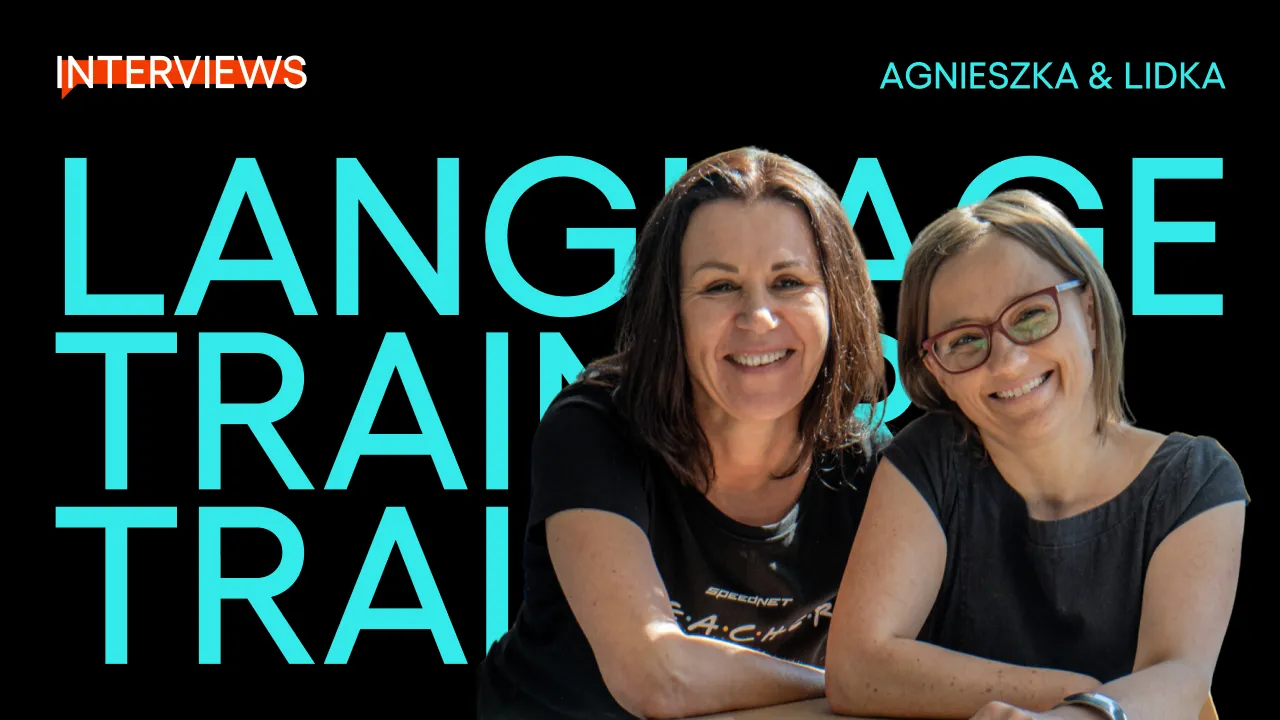#TeamSpeednet: Agnieszka and Lidka, language trainers


Discover the stories of Agnieszka and Lidka, instructors who teach German and English at Speednet. Learn how they created a friendly learning atmosphere by focusing on communication and practical skills. Read the interview to get inspired by their methods and approach!
How did your journey with teaching foreign languages begin? What inspired you to become a language trainer?
Lidka: When I was studying English philology, internships in schools were the next stage of our education. After my second year working in a school, I felt that teaching English and working with people would be my path. I didn’t plan this, although probably the fact that my mother is an English teacher might have had a significant influence. Besides, being a teacher gave me the chance to have a few months of vacation, which I could use for my second job, or rather my passion, which is tourism. Initially, 2-3 months turned into 4, and every summer I could work abroad, honing my English while guiding tours. This was a great break from teaching for the next 15 years, except for a 3-year hiatus when I paused my teaching career to become a full-time tour guide, using English daily.
Aga: For me, it looked completely different and wasn’t as obvious. When I was in high school, right up until April before my final exams, I planned to apply for film directing. I ran the school theatre and organized performances, and it was my dream job. However, in April, I got stressed, started doubting that I would pass, and thought it was a crazy idea. I decided that I needed a “normal” profession that would allow me to make a living.
Since I always liked learning languages and it came easily to me, I decided to study languages. I chose German studies because I had been learning German in high school and thought it would be the easiest for me. Language studies open many opportunities, so it seemed like a good idea. I must admit that German wasn’t my favourite language, but over time, especially reading German literature, I appreciated its beauty and richness. German literature is great; it’s even said to be the language of poets and philosophers.
I wanted to become a translator, so I continued my education in postgraduate studies. At first, I started working as an instructor at the Medical Academy, where I taught students medical language. Additionally, I began doing medical translations, which I still do today. In the meantime, I passed the certified translator exam, and now translations are my additional job. I also worked in middle school and conducted private courses. Two years after graduation, I started my own business and gradually conducted more and more classes with adults, working less in school. After having children and a short break, I decided not to return to school and focus on my own business. I started working in two companies, and a year later, I was offered a job at Speednet.
How long have you been working at Speednet?
Lidka: In October, it will be eight years – I’m slowly becoming a dinosaur [laughs]. I got here through a recommendation. At first, I started coming to Speednet for a few hours a week, and over the years, as the company grew, the number of my group and individual lessons also increased.
In the past, I worked with many companies simultaneously. Over the years, there were about thirty from various industries, but recently I decided to narrow that number down. I gave up working with other companies where I worked under similar terms in favour of Speednet. And that’s how it stayed.
Aga: I’ve been here for five and a half years – time flies incredibly fast. I got here thanks to one of my first students from middle school. He started working at Speednet and recommended me for the job. Now it’s my main company, where I have the most hours and which I like the most.
What teaching methods do you use in your work?
Lidka: Primarily, conversation, which was also my area of interest during my studies. My thesis was about teaching language based on the communicative method, and it’s still very important to me. Even though we always have a leading topic to work on in the classes, I try to find space for free conversation. We share inspirations, news, good movies, and ideas for a fun weekend. This is the main idea of my classes. I rely on authentic materials, movies, current newspaper articles, and podcasts, and I’m not a fan of textbooks. I enjoy working with quizzes and incorporating gamification elements.
Aga: I also primarily use the communicative method, focused on speaking, and I try to combine learning different skills. German is a very grammatical language, so it’s impossible to master it without knowing the grammar. We learn it in class, but from the first lessons, I encourage people to speak, to answer questions, and to formulate statements. We read, listen, and watch movies – I try to keep the lessons varied.
Is teaching in a company different from traditional teaching in a school?
Lidka: Definitely. During my internships, I taught in a school, and it was classic teaching. My adventure with the school was short because I didn’t fit into that system and institution. I started working professionally in language schools in the Trójmiasto area, and from the very beginning, I was oriented towards teaching in companies. Practically my entire professional career is based on teaching business English, where you don’t follow a top-down imposed program but create a course based on the needs of the students. The topics of the classes often revolve around issues related to a particular industry. In the case of Speednet, its project management, methodologies, and daily challenges faced by testers, developers, or analysts. Aside from the specific topics, a major challenge for many learners is the lack of comfort in business situations like small talk. Every business meeting goes more smoothly if the atmosphere is a bit less formal and impersonal and the initial ice is broken. Getting used to a typical question like “How are you?” is important because culturally, we’re not accustomed to it at all.
Aga: I think it’s also worth highlighting that here, the people who learn want to, not because they have to. Secondly, the conditions are very friendly – there’s a pleasant room and modern technology. The atmosphere at Speednet is supportive, non-judgmental, and based on mutual trust. If someone doesn’t betray that trust, they have a lot of freedom – no one controls or checks whether the next stage of education has been completed. If they see that you’re trying and working well, you can arrange your learning plan. Besides, great people are working here, whom I also like personally, so such work is very enjoyable. We have a lot of independence, freedom, and partner-like relationships.
What are the biggest challenges in teaching foreign languages at Speednet?
Lidka: The biggest challenge in teaching languages, not just at Speednet, is dealing with a certain stage of the learning curve known as the “period of frustration.” This is the moment when, despite the work and effort put in, we feel like we’re no longer making progress. It’s entirely natural that after a certain period, the results of learning are no longer as spectacular as they were at the beginning, which can negatively impact motivation. The most satisfying part for a teacher is working at the beginning of this journey, when progress is felt, adding energy and boosting confidence and awareness of one’s abilities. But later, when students feel they have already achieved a lot and further progress is less visible, difficulties begin. In other words, learning a language is a bottomless pit, and it’s worth constantly raising the bar.
Aga: As for the German language, I think the biggest challenge is encouraging people to learn it. Unfortunately, many people have negative associations with it. I think about 8 out of 10 people who come to me say it’s their worst memory from school. It’s crucial to dispel these negative associations and change their perception. The difficulties stem from school traumas, the perception of German as a difficult language, and historical connotations. Those who have dared to come to lessons often, to my delight, admit that they have changed their approach. Of course, some people find that it’s ultimately not the language for them for various reasons.
I would also add that AI can be a challenge for language teachers. However, I think it mainly impacts the translation industry. Learning languages through human interaction will continue for a long time. According to neuroscientists studying learning processes, learning is much more effective in contact with another person than with a machine. AI shouldn’t take our jobs, but our work will change under its influence, and we will use it more.
How do you assess the language proficiency level of Speednet employees at the beginning and during your collaboration?
Lidka: Currently, we have ten groups at Speednet at various levels, mainly ranging from B1 to C1. Having worked here for eight years, I’ve had the pleasure of teaching many people, and I’m delighted with their progress. With some, we started from A1, and today we’re already managing the B2 level. Of course, there’s some rotation in the groups; some people take a break from learning for a while and then return, which is very healthy in this whole process. I also try to motivate them to work independently because attending classes is only part of this journey.
Aga: When I started working here, there were four groups – two complete beginners, one at the elementary level, and one advanced conversational group. Currently, I don’t have a typical conversational group. However, from time to time, a new group is formed, and the beginning of learning usually looks similar – either they are people who want to learn from scratch or those who studied in school but claim they don’t remember anything (which usually isn’t entirely true [laughs]). I’m very pleased that some have been learning continuously since I first came here. These people have already moved up several levels, starting from the absolute basics. Now, we can talk about various topics in class, which is wonderful.
Have you noticed any specific language needs that are characteristic of employees in the IT industry?
Lidka: I try to involve the learners themselves in the process of creating our topics and regularly ask for their ideas and needs. It turns out that we are most interested in conversation, expanding vocabulary, improving fluency and pronunciation, and getting along. An interesting idea was to create a group just for our analysts, where we can focus on specific topics related to their work. I have to admit that it works very well. In other groups, we regularly work on the language they will need professionally, such as meeting language, idiomatic expressions, banking, and AI.
Aga: Group classes are generally focused on general language, aimed at communication. With CEO Piotr, we sometimes have lessons where we use business vocabulary. I also introduce elements of business language in individual lessons if the learners want and need it. I value feedback and try to respond to the needs.
How has conducting online classes changed your work?
Lidka: I had already been conducting online classes for a long time, although not at Speednet, but in my lessons. At Speednet, after the pandemic, our groups naturally became hybrids. Some people come to the office, and some join remotely. Technically, it varies, but in terms of team building, it’s great. People working on different projects can get to know each other and build relationships, having contact with our office’s daily life. I believe in the energy of the group when we are all in one place and have direct eye contact, but the ability to join remotely is a very good solution, especially for those who don’t regularly work in the office.
Aga: For me, it changed quite significantly because, before the pandemic, I had never conducted online classes. I received inquiries about online learning, but I always thought it wasn’t for me. The pandemic forced me to try it, and it turned out to work. I prefer live classes; I find them more effective and enjoyable. However, the remote option is very practical. If someone can’t be in the office or works in another city, they can still join and participate in the classes. So now I gladly use the hybrid or remote option.
What advice would you give to people who are just starting their journey of learning foreign languages?
Lidka: First and foremost, immersion in the language is key. Find something that motivates you, like podcasts, games, or TV shows, preferably on a topic that interests you. If you like crime stories, read crime novels in English. It’s very important to interact with the language in a way that gives you pleasure and makes it much easier to assimilate. When you meet with a teacher or a group, you’ll be able to apply and verify what you’ve learned. Try to incorporate new words, phrases, and idioms you’ve learned into your speech. If you want to see real progress, treat lessons with a teacher as only one-fourth of the time you want to dedicate to learning. Embrace homework and be consistent in your studies!
Aga: I would also add, first and foremost: don’t be afraid. Get rid of stereotypes and negative associations, open up to the language, and trust that it can be enjoyable and useful. It’s also worth noting and appreciating that German is very often required as a second language in the Polish job market. One of my HR colleagues says that people who know German and have specialized education are highly sought after and quickly find jobs. Even though many Germans speak English, they appreciate it when their colleagues know at least the basics of German.
What do you like most about working at Speednet? Do you have any interesting anecdotes related to the classes or a company event?
Lidka: It may not be original, but the people are the greatest asset of this job. They are the reasons I don’t want to look for a new job and why I feel good here. I enjoy our group meetings, individual lessons, conversations on various topics, and those priceless digressions 🙂 We’ve known each other for a long time, and that pays off. I’m very pleased that in several groups and many individual lessons, we have common topics of conversation, a similar curiosity about the world, travels, social and cultural changes – topics from my second studies at the Faculty of Social Sciences. Besides that, I highly value all the grassroots and top-down Speednet initiatives and extracurricular ideas. Of course, everything according to one’s interests – I’m particularly drawn to the activities called handicrafts – greetings to Asia, bridge – hello Agnieszka, and urbex with Mariusz. And I promise myself that I will seriously return to ping pong – hello Błażej [laughs].
Aga: For me, the atmosphere is the most important. I enjoy coming here, and I do so with great pleasure. I remember talking to Piotr at one event, and he said that when he comes to the office, he doesn’t feel like he’s going to work, and I think the same way. Of course, I take my work very seriously, but I come here with joy because it’s pleasant and relaxing. The atmosphere is incomparable to anything else. I’ve worked in different companies, but nowhere has been like here. Another important element is the high level of trust, which is not so obvious in many companies. To sum up, the absolute strength of Speednet is the people, both those managing the company and the employees.




